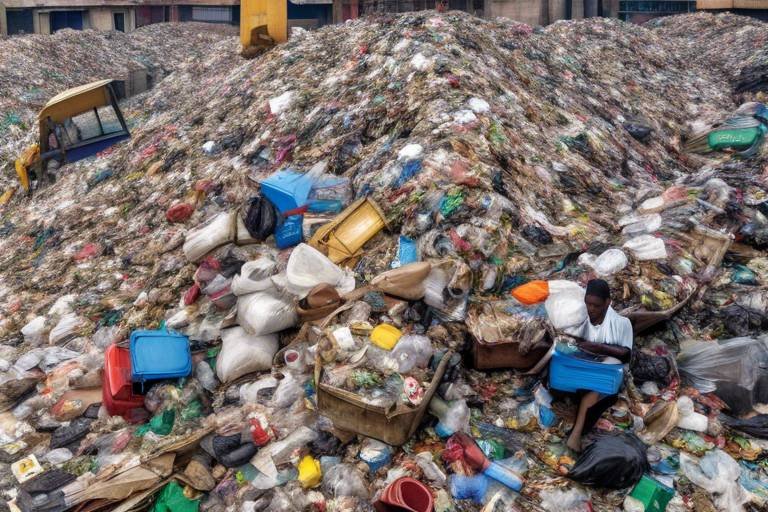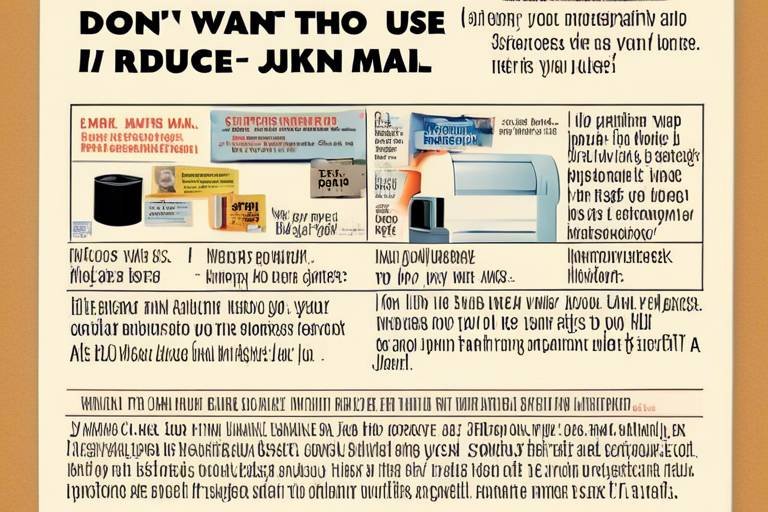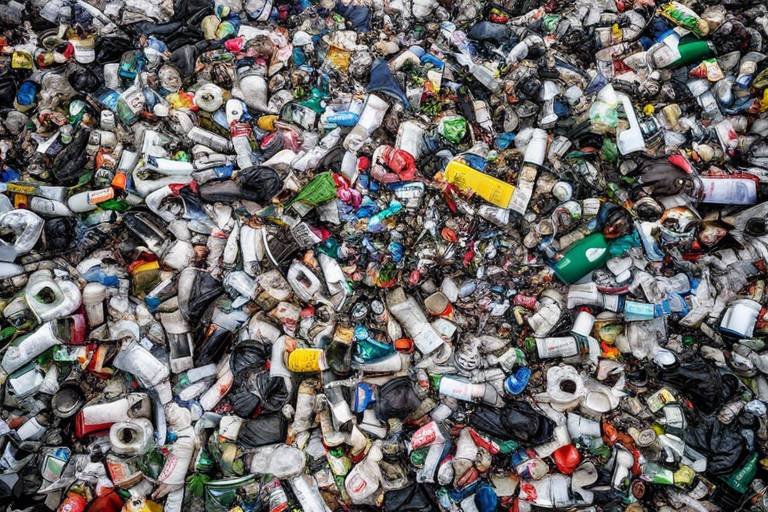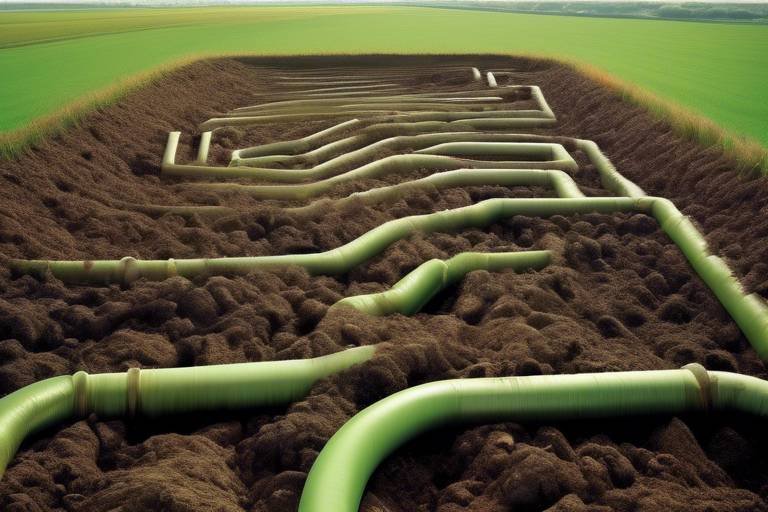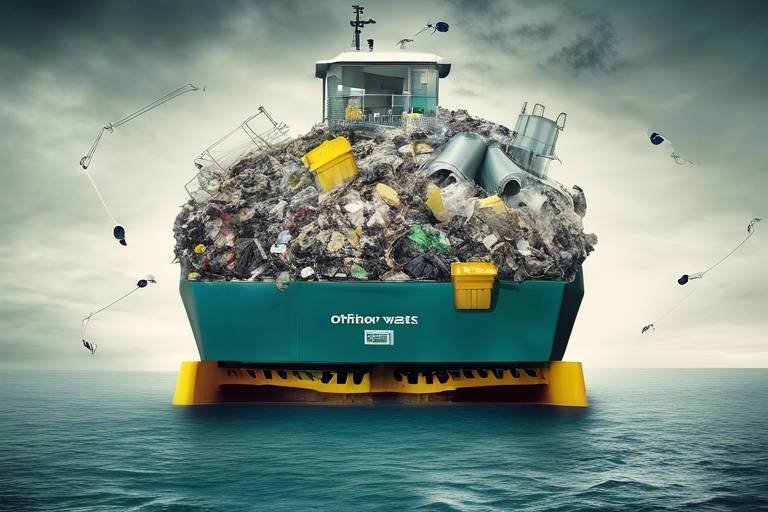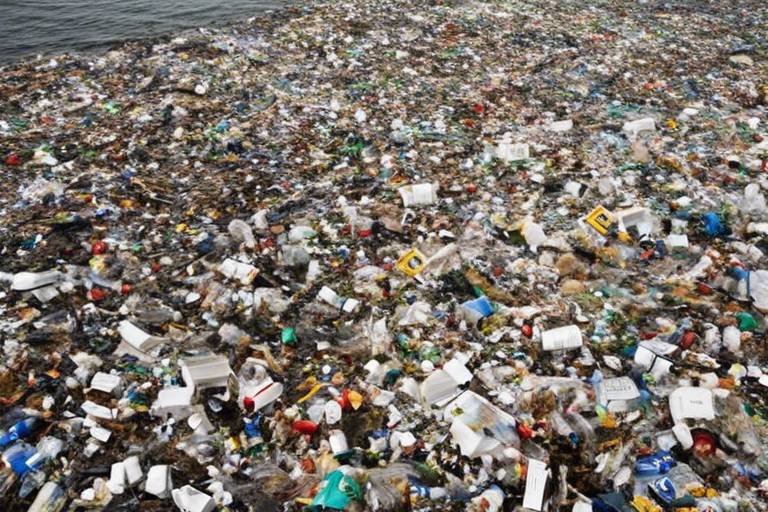How Informal Sector Contributes in Waste Management and Recycling
The informal sector plays an essential role in waste management and recycling, particularly in urban areas where waste generation is at its peak. When we think about waste, we often picture large trucks collecting garbage, but the reality is much more complex. Informal waste collectors, often overlooked, are the unsung heroes of our cities. They sift through trash, retrieving valuable recyclable materials that would otherwise be tossed into landfills, contributing significantly to environmental sustainability and resource recovery. Imagine a bustling city where every piece of plastic and metal is accounted for, not wasted but transformed into something new. This is the vision that informal waste collectors help bring to life.
Informal waste collectors, often working independently or in small groups, operate outside the formal waste management systems. They are the ones who brave the streets and alleys, collecting discarded materials that have the potential for reuse or recycling. By doing so, they not only help reduce the burden on municipal waste management but also contribute to a circular economy. Their efforts lead to a significant decrease in the volume of waste sent to landfills, which is a critical factor in combating environmental degradation. In many cities, these collectors are the first line of defense in waste management, and their work is invaluable.
The informal recycling sector is not just about environmental benefits; it also has a profound economic impact. It generates substantial financial benefits by providing livelihoods for thousands of individuals, particularly in marginalized communities. These collectors often rely on the income generated from selling recyclable materials to support their families. In fact, studies have shown that the informal recycling sector can reduce municipal waste management costs significantly. By diverting waste from landfills, cities can save money on disposal fees, allowing funds to be redirected towards other community needs.
One of the most compelling aspects of the informal sector is its ability to create employment opportunities. Many people, especially those from disadvantaged backgrounds, find work as waste collectors, contributing to their communities while earning a living. This sector not only helps alleviate poverty but also fosters a culture of recycling and resource recovery. The informal economy is a lifeline for many, showcasing how even the most marginalized individuals can contribute positively to society.
Across the globe, several cities have successfully integrated informal recycling initiatives into their formal waste management systems. For example, in Brazil, programs have been established that recognize the contributions of informal collectors, providing them with necessary training and resources. These initiatives have led to improved efficiency in waste management and increased recycling rates. By showcasing the potential of collaboration between formal and informal sectors, these case studies serve as inspiring examples for other cities looking to enhance their sustainability efforts.
Despite the significant contributions of informal waste workers, they face numerous challenges that hinder their ability to operate effectively. One major issue is the lack of recognition; many informal workers are seen as outcasts, which can lead to inadequate safety measures and limited access to resources. Imagine working tirelessly to clean up your community only to be overlooked and undervalued. This situation not only affects their morale but also poses serious risks to their health and safety while working. Addressing these challenges is crucial for empowering informal workers and enhancing their contributions to waste management.
The environmental benefits of informal recycling are substantial. By diverting waste from landfills, informal collectors help reduce greenhouse gas emissions, which are a major contributor to climate change. Their work promotes more sustainable waste management practices within communities, encouraging a shift towards a more responsible and eco-friendly approach to consumption and disposal. When we think of recycling, we often consider it as a chore, but informal workers transform it into a community effort, showing us that every small action counts.
To maximize the potential of the informal sector in waste management, it is imperative to integrate these workers into formal policies. This integration can enhance efficiency, improve working conditions, and promote sustainable practices. Recognizing the contributions of informal workers is not just a matter of social justice; it is essential for building a more effective waste management system. By creating supportive environments, cities can harness the full potential of the informal recycling sector.
Establishing legal frameworks that recognize and protect the rights of informal workers is fundamental for fostering a more inclusive waste management system. These frameworks can provide informal workers with access to resources, training, and safety measures, ensuring that they can operate effectively and safely in their roles. Imagine a world where every waste collector feels valued and supported—this is the future we can work towards.
Implementing training programs for informal waste collectors is another crucial step. These programs can enhance their skills, improve safety practices, and increase their efficiency, ultimately benefiting the entire waste management system. By investing in the development of informal workers, cities can create a more robust and sustainable waste management framework that benefits everyone.
- What is the informal sector in waste management?
The informal sector consists of individuals and groups who collect, sort, and recycle waste outside of formal systems. They play a vital role in urban waste management. - How does the informal sector contribute to recycling?
Informal waste collectors retrieve recyclable materials from trash, reducing landfill waste and promoting environmental sustainability. - What challenges do informal waste workers face?
Challenges include lack of recognition, inadequate safety measures, and limited access to resources. - Why is integrating the informal sector into formal waste management important?
Integration enhances efficiency, improves working conditions, and recognizes the valuable contributions of informal workers.

The Role of Informal Waste Collectors
When you think about waste management, the first thing that probably comes to mind is the big, shiny garbage truck rolling through your neighborhood. But hidden behind the scenes, there’s a whole army of unsung heroes—the informal waste collectors. These individuals are often overlooked, yet they play a crucial role in urban waste management systems worldwide. Imagine a bustling city where heaps of waste are scattered everywhere; without these collectors, a significant portion of recyclable materials would end up in landfills, taking a toll on our environment.
Informal waste collectors, often working independently or in small groups, scour the streets, alleys, and markets to gather recyclable materials. They sift through trash, picking out items like plastic bottles, paper, metals, and glass, which can be recycled and reused. This not only helps reduce the volume of waste but also promotes environmental sustainability. In many urban areas, these collectors are responsible for recovering as much as 50% of recyclable materials that would otherwise be lost. It’s like finding hidden treasures in a sea of garbage!
But it’s not just about the environment. The economic impact of informal waste collectors is profound. They contribute to the local economy by providing low-cost recycling services, which can significantly reduce municipal waste management costs. For example, cities that integrate informal collectors into their waste management systems often see a decrease in overall waste disposal expenses. It’s a win-win situation where the city saves money, and collectors earn a living by doing their part for the planet.
Moreover, these collectors often belong to marginalized communities, providing them with a vital source of income. In many cases, this work is their only means of survival, helping to alleviate poverty in urban areas. By recognizing the contributions of informal waste collectors, we can foster a culture of recycling and resource recovery that benefits everyone. It’s essential to remember that behind every piece of recycled material, there’s a person dedicated to making our world a cleaner place.
Despite their significant contributions, informal waste collectors often face numerous challenges. They operate in a legal gray area, lacking formal recognition and support from local governments. This can lead to unsafe working conditions, as they often lack the necessary safety gear and training to handle waste appropriately. Furthermore, without access to resources or support networks, their ability to operate effectively is severely limited. Addressing these challenges is crucial for enhancing their role in waste management.
In conclusion, informal waste collectors are the backbone of urban recycling efforts. Their work not only alleviates pressure on municipal waste management systems but also promotes sustainability and economic resilience in their communities. Recognizing and supporting these individuals is essential for creating a more effective and inclusive waste management system. As we move forward, let’s ensure that the contributions of informal waste collectors are valued and integrated into our broader waste management strategies.
- What is the role of informal waste collectors? Informal waste collectors gather recyclable materials from waste, preventing them from ending up in landfills and contributing to environmental sustainability.
- How do informal waste collectors impact the economy? They provide low-cost recycling services, reduce municipal waste management costs, and offer livelihoods to marginalized communities.
- What challenges do informal waste collectors face? They often lack legal recognition, face unsafe working conditions, and have limited access to resources and support.
- How can we support informal waste collectors? By recognizing their contributions, creating supportive legal frameworks, and providing training and resources to enhance their skills and safety.

Economic Impact of Informal Recycling
The informal recycling sector is a powerhouse of economic activity that often goes unnoticed in the grand scheme of waste management. It generates substantial economic benefits, providing livelihoods for countless individuals while simultaneously reducing municipal waste management costs. Imagine a bustling city where trash is not just discarded but transformed into valuable resources—this is the reality created by informal recyclers. They operate in the shadows, yet their contributions are vital to the economic landscape of urban environments.
One of the most significant impacts of informal recycling is the job creation it fosters. Informal waste collectors, often referred to as "waste pickers," are typically from marginalized communities who rely on this work for their survival. They sift through waste to find recyclable materials, which they then sell to recycling centers or directly to manufacturers. This not only provides them with a source of income but also helps to alleviate poverty. According to recent studies, the informal sector can create thousands of jobs in a single city, showcasing its potential to be a key player in economic development.
Moreover, the economic benefits extend beyond just employment. By diverting waste from landfills, informal recyclers significantly reduce the costs associated with municipal waste management. Cities spend millions of dollars every year on waste disposal, but when informal recyclers step in, they help to lighten this financial burden. For instance, a study conducted in Brazil found that the city of São Paulo saved approximately $20 million annually due to the efforts of informal waste collectors. This is a clear indication of how integrating informal recycling into the formal waste management system can lead to substantial savings.
To illustrate the economic impact further, consider the following table that outlines the contributions of informal recycling to local economies:
| City | Annual Savings from Informal Recycling | Jobs Created |
|---|---|---|
| São Paulo, Brazil | $20 million | 10,000 |
| Delhi, India | $15 million | 15,000 |
| Nairobi, Kenya | $5 million | 5,000 |
These figures highlight not only the financial savings but also the substantial number of jobs that informal recycling can create. It's a win-win situation: cities save money, and individuals gain employment. However, the informal sector is not without its challenges. Despite its economic contributions, informal recyclers often work under precarious conditions, lacking the support and recognition they deserve.
In conclusion, the informal recycling sector is a crucial component of urban economies, driving job creation and reducing waste management costs. Recognizing and supporting these informal workers can lead to a more sustainable and economically viable waste management system. By embracing the contributions of informal recyclers, cities can tap into a wealth of resources that not only benefit the environment but also uplift communities.
- What is the informal recycling sector? The informal recycling sector consists of individuals or groups who collect, sort, and sell recyclable materials, often operating outside of formal waste management systems.
- How does informal recycling benefit the economy? Informal recycling creates jobs, reduces municipal waste management costs, and contributes to resource recovery, thus providing economic benefits to communities.
- What challenges do informal waste collectors face? Informal waste collectors often face challenges such as lack of recognition, inadequate safety measures, and limited access to resources.

Employment Opportunities in Informal Recycling
The informal recycling sector is a bustling hub of activity that plays a vital role in urban waste management. It’s not just about collecting trash; it’s about creating opportunities and livelihoods for many individuals, especially those from marginalized communities. Imagine a bustling street corner where individuals are sorting through discarded materials, transforming what others see as waste into valuable resources. This scene is not just common; it’s a lifeline for many families.
In many cities worldwide, informal waste collectors are often the unsung heroes of recycling. They sift through heaps of garbage, extracting recyclable materials like plastics, metals, and paper, which can be sold to recycling facilities. This not only helps reduce the volume of waste sent to landfills but also provides a source of income for these workers. According to studies, informal recycling can generate a significant portion of the total recycling rate in urban areas, sometimes reaching over 50% in certain regions.
Furthermore, the employment opportunities created by informal recycling are diverse. Workers in this sector may engage in a variety of roles, including:
- Collection: Gathering recyclable materials from streets, homes, and businesses.
- Sorting: Separating materials based on type and quality to maximize value.
- Processing: Cleaning and preparing materials for sale to recycling facilities.
- Sales: Negotiating prices and selling collected recyclables to local businesses.
These roles are not just jobs; they represent a means of survival for many. The informal sector often employs individuals who might struggle to find work in the formal economy due to various barriers, such as lack of education or legal documentation. By providing these employment opportunities, informal recycling initiatives help to alleviate poverty in urban areas.
Moreover, the informal recycling sector promotes a culture of sustainability. Workers often develop a deep understanding of waste management practices and contribute to community awareness about recycling. They become advocates for environmental consciousness, inspiring others to think twice before throwing items away. This ripple effect can significantly enhance community engagement in sustainability efforts.
However, it’s important to recognize that while the informal sector provides these valuable opportunities, it often operates under precarious conditions. Workers typically lack access to social protections, health benefits, and safe working environments. Addressing these challenges is crucial for enhancing the positive impact of informal recycling on employment and community sustainability.
In conclusion, the informal recycling sector is more than just a means to manage waste; it is a vital source of employment and economic activity. By integrating these workers into formal waste management systems and recognizing their contributions, cities can not only improve their recycling rates but also support the livelihoods of thousands of individuals.
- What is the informal recycling sector? The informal recycling sector consists of individuals or groups who collect, sort, and sell recyclable materials without formal recognition or support from governmental bodies.
- How does informal recycling benefit the environment? Informal recycling reduces the amount of waste sent to landfills, lowers greenhouse gas emissions, and promotes resource recovery, contributing to overall environmental sustainability.
- What challenges do informal waste collectors face? Informal waste collectors often face challenges such as lack of recognition, inadequate safety measures, and limited access to resources, which can hinder their effectiveness and safety.
- How can cities support informal recyclers? Cities can support informal recyclers by integrating them into formal waste management systems, providing training, and establishing legal frameworks that protect their rights.
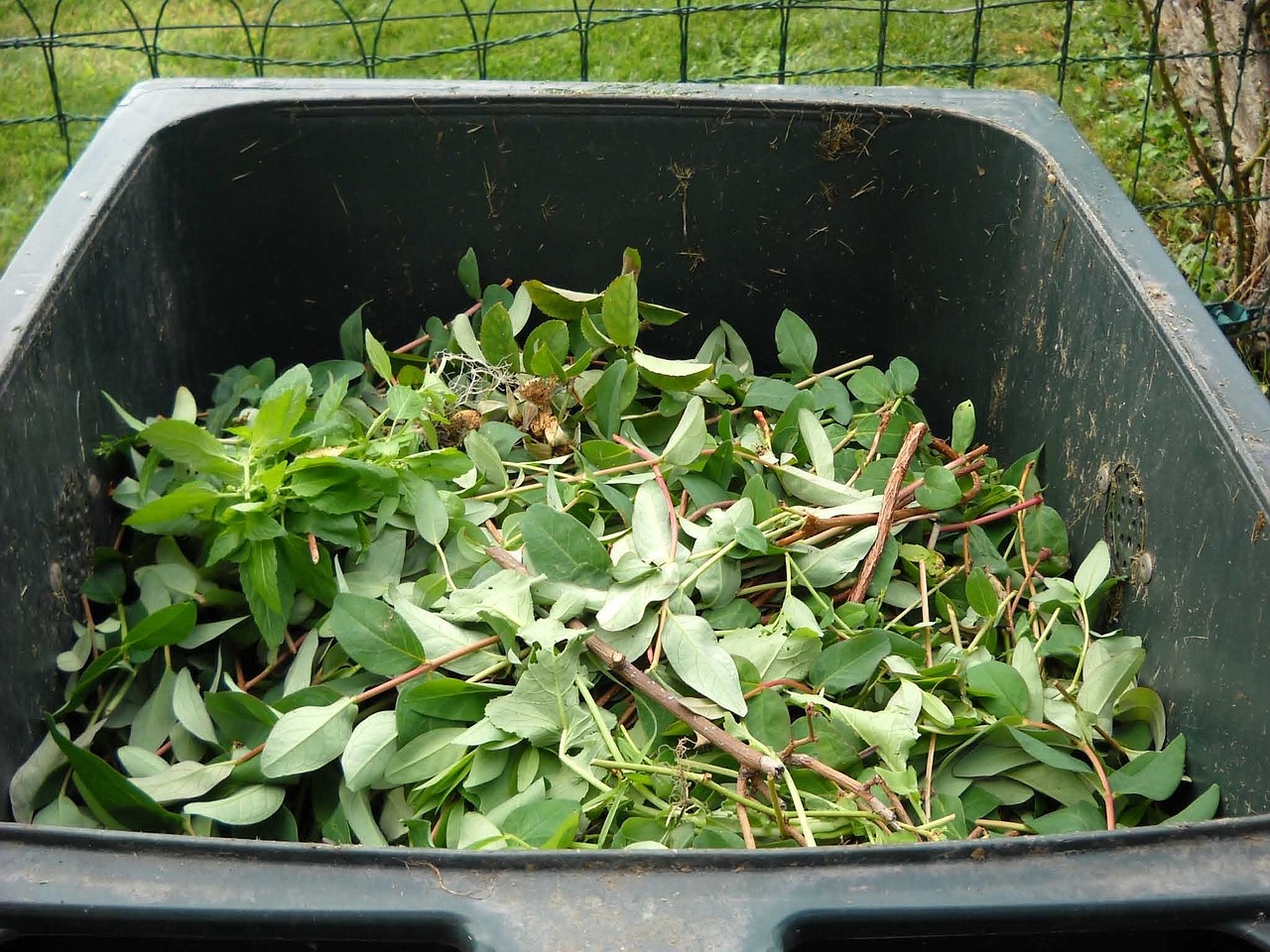
Case Studies of Successful Informal Recycling Initiatives
The integration of the informal sector into waste management systems has proven to be a game-changer in various urban settings around the globe. One standout example is the city of Bangalore, India, where informal waste collectors, often referred to as "ragpickers," have been successfully incorporated into the formal waste management framework. This collaboration has not only enhanced recycling rates but has also significantly improved the livelihoods of these workers. By recognizing the role of ragpickers, the city has seen a remarkable increase in the recovery of recyclable materials, with estimates suggesting that nearly 20% of the city's waste is now recycled through these informal networks.
Another compelling case is found in Capetown, South Africa. Here, the local government has partnered with informal waste pickers to create a more efficient waste management system. Through training programs and the provision of resources, these workers have been empowered to increase their efficiency and safety while collecting recyclables. As a result, the city has reported a 30% reduction in landfill waste and improved environmental conditions. This initiative not only benefits the environment but also fosters a sense of community ownership and engagement among residents.
In Rio de Janeiro, Brazil, the "Catadores" (informal waste collectors) have established a cooperative model that has transformed their operations. This cooperative approach has allowed them to negotiate better prices for the materials they collect and has provided a platform for advocacy and recognition of their contributions to waste management. The cooperative has successfully diverted thousands of tons of waste from landfills, showcasing the potential of informal workers to contribute significantly to urban sustainability. Their efforts have led to a 50% increase in recycling rates in certain neighborhoods, proving that when given the right support, informal workers can drive substantial change.
These case studies highlight the incredible potential of informal recycling initiatives to not only address waste management challenges but also to uplift communities economically and socially. By integrating informal workers into formal systems, cities can leverage their knowledge and skills, leading to a more sustainable and efficient waste management process. As we look to the future, it is essential to continue exploring and supporting such initiatives to maximize their impact.
- What is the informal sector in waste management?
The informal sector in waste management consists of individuals or groups who collect, sort, and recycle waste materials outside of formal municipal systems. They often operate independently and play a crucial role in recycling and resource recovery. - How does the informal sector contribute to sustainability?
By collecting recyclable materials that would otherwise end up in landfills, the informal sector helps reduce waste, lower greenhouse gas emissions, and promote a culture of recycling, contributing to environmental sustainability. - What challenges do informal waste collectors face?
Informal waste collectors often face challenges such as lack of recognition, inadequate safety measures, and limited access to resources, which can hinder their ability to operate effectively and safely.

Challenges Faced by Informal Workers
The life of informal waste workers is often fraught with challenges that can impede their ability to contribute effectively to waste management and recycling efforts. Despite their significant role in the ecosystem, these workers face a myriad of obstacles that can be both daunting and disheartening. One major issue is the lack of recognition from formal authorities. Informal workers operate in the shadows, often overlooked by policymakers who fail to acknowledge their contributions. This lack of visibility means that they miss out on crucial support systems that could enhance their working conditions.
Moreover, safety is a paramount concern for these workers. Many informal waste collectors work without proper protective gear, exposing themselves to hazardous materials and dangerous environments. The absence of adequate safety measures not only puts their health at risk but also limits their productivity. Imagine sorting through piles of waste, with sharp objects and toxic substances lurking around every corner—it's a grim reality for many. This precarious situation is compounded by the fact that informal workers often lack access to essential resources, such as financial support and training, which could help them operate more safely and efficiently.
Another significant challenge is the economic instability that comes with informal work. These workers typically earn a meager income, fluctuating based on the volume of waste they collect and the market demand for recyclables. This instability can lead to a cycle of poverty, making it difficult for them to invest in their own health, education, or even their businesses. In many cases, they are also vulnerable to exploitation by middlemen who take advantage of their desperate situation, further diminishing their earnings.
To paint a clearer picture, consider the following table, which outlines some of the primary challenges faced by informal waste workers:
| Challenge | Description |
|---|---|
| Lack of Recognition | Informal workers are often ignored by policymakers and miss out on support systems. |
| Inadequate Safety Measures | Workers often lack protective gear, exposing them to hazardous conditions. |
| Limited Access to Resources | They face challenges in acquiring financial support and training opportunities. |
| Economic Instability | Income fluctuates, making it hard to escape the cycle of poverty. |
In addition to these challenges, informal workers often deal with social stigma. Society tends to view their work as less legitimate than formal employment, which can lead to feelings of shame and isolation. This stigma can further hinder their ability to organize and advocate for better working conditions. All these factors combined create a challenging environment that can stifle the potential of informal workers in the waste management sector.
Recognizing and addressing these challenges is crucial for creating a more equitable and effective waste management system. By bringing informal workers into the fold and offering them the support they need, we can not only improve their lives but also enhance the overall efficiency and sustainability of waste management practices in urban areas.
- What is the informal sector in waste management? The informal sector consists of unregulated waste collectors who play a vital role in recycling and resource recovery.
- Why are informal waste workers important? They help reduce waste in landfills and contribute to environmental sustainability by recycling materials.
- What challenges do informal workers face? They face issues such as lack of recognition, inadequate safety measures, limited access to resources, and economic instability.
- How can we support informal waste workers? By integrating them into formal waste management systems, providing training, and recognizing their contributions.

Environmental Benefits of Informal Recycling
Informal recycling is not just a side hustle; it's a vital cog in the wheel of urban waste management. These unsung heroes, often working behind the scenes, play a crucial role in reducing the volume of waste that ends up in landfills. By collecting and sorting recyclable materials, they help divert significant amounts of waste from these sites, which in turn contributes to a healthier environment. Can you imagine the sheer volume of plastic, paper, and metal that would otherwise clutter our cities? Informal recyclers are the ones who step in to prevent this from happening!
Moreover, informal recycling has profound environmental benefits that extend beyond mere waste reduction. For instance, it significantly lowers greenhouse gas emissions. When waste decomposes in landfills, it releases methane, a potent greenhouse gas that contributes to climate change. By recycling materials, informal workers help minimize the amount of waste that decomposes in these settings. This is akin to planting trees—each piece of recycled material is a step towards a cleaner, greener planet.
Let's break down the environmental impact of informal recycling:
| Benefit | Description |
|---|---|
| Waste Diversion | Informal recyclers divert substantial amounts of waste from landfills, reducing overall waste volume. |
| Reduction in Greenhouse Gas Emissions | By recycling materials, they help prevent methane emissions from decomposing waste. |
| Resource Recovery | Informal recycling promotes the recovery of valuable materials, reducing the need for virgin resources. |
| Community Awareness | Informal recyclers often educate their communities about the importance of recycling and sustainability. |
In addition to these benefits, informal recycling fosters a culture of sustainability within communities. When people see their neighbors actively engaging in recycling, it inspires them to do the same. It’s like a ripple effect—one small action can lead to a wave of change. Informal recyclers often serve as community ambassadors, spreading the word about the importance of recycling and encouraging others to participate in sustainable practices.
However, the journey of informal recycling is not without its challenges. Despite their significant contributions, these workers often lack recognition and support from formal waste management systems. Addressing this gap is crucial for maximizing their potential. Imagine if we could integrate their efforts with formal systems—what a powerful alliance that would be! Not only would it enhance recycling rates, but it would also create a more cohesive approach to waste management.
In conclusion, the environmental benefits of informal recycling are immense. From waste diversion to community education, these workers are pivotal in promoting sustainability. As we continue to grapple with the challenges of waste management, recognizing and supporting the contributions of informal recyclers is essential. After all, a cleaner, greener future is a collective responsibility, and every little bit counts!
- What is informal recycling? Informal recycling refers to the collection and processing of recyclable materials by individuals or groups not officially recognized by the government or formal waste management systems.
- How does informal recycling benefit the environment? It reduces landfill waste, lowers greenhouse gas emissions, and promotes resource recovery, contributing to a more sustainable waste management system.
- What challenges do informal recyclers face? They often encounter issues such as lack of recognition, inadequate safety measures, and limited access to resources, which can hinder their effectiveness.
- How can we support informal recyclers? By recognizing their contributions, integrating them into formal waste management systems, and providing training and resources to improve their working conditions.

Policy Recommendations for Integration
Integrating the informal sector into formal waste management policies is not just a good idea; it’s essential for creating a more efficient and sustainable waste management system. Think of the informal sector as the unsung hero of recycling—often overlooked, but absolutely vital in the fight against waste. By recognizing and supporting these informal workers, we can unlock their potential and enhance the overall effectiveness of waste management practices in urban environments.
One of the first steps in this integration is establishing supportive legal frameworks. This means creating laws and regulations that acknowledge the contributions of informal waste collectors and protect their rights. These frameworks should not only recognize their role but also provide them with the necessary tools to operate safely and efficiently. Imagine a world where waste collectors are equipped with proper identification and legal backing—this could foster a sense of legitimacy and respect for their work.
Additionally, training and capacity building initiatives are crucial. By investing in training programs, we can enhance the skills of informal waste workers, improve their safety practices, and ultimately increase their efficiency. For instance, training can cover essential topics such as sorting techniques, safety measures, and even basic business management skills. This is not just about improving individual performance; it’s about building a stronger community of recyclers who can contribute to a greener planet.
Furthermore, collaboration between formal waste management systems and informal collectors can lead to innovative solutions. For example, cities could establish partnerships that allow informal collectors to access municipal resources, such as waste sorting facilities or equipment. This collaboration could take many forms, such as:
- Joint waste collection initiatives
- Shared access to recycling centers
- Incentive programs for recycling performance
Such partnerships not only enhance efficiency but also create a sense of community and shared responsibility towards waste management. It’s like forming a team where everyone plays a vital role—when informal collectors and formal systems work together, the whole community benefits.
In conclusion, integrating the informal sector into formal waste management policies is a win-win situation. By creating supportive legal frameworks, investing in training, and fostering collaboration, we can recognize the invaluable contributions of informal workers while promoting sustainable practices in waste management. It’s time to shine a light on the informal sector and embrace the potential it holds for a cleaner, greener future.
Q1: Why is it important to integrate the informal sector into formal waste management systems?
A1: Integrating the informal sector is crucial because it enhances efficiency, recognizes the contributions of informal workers, and promotes sustainable practices, leading to better waste management outcomes.
Q2: What are some challenges faced by informal waste collectors?
A2: Informal waste collectors often face challenges such as lack of recognition, inadequate safety measures, and limited access to resources, which can hinder their effectiveness and safety.
Q3: How can training programs benefit informal waste workers?
A3: Training programs can enhance the skills of informal workers, improve their safety practices, and increase their efficiency, ultimately benefiting the entire waste management system.
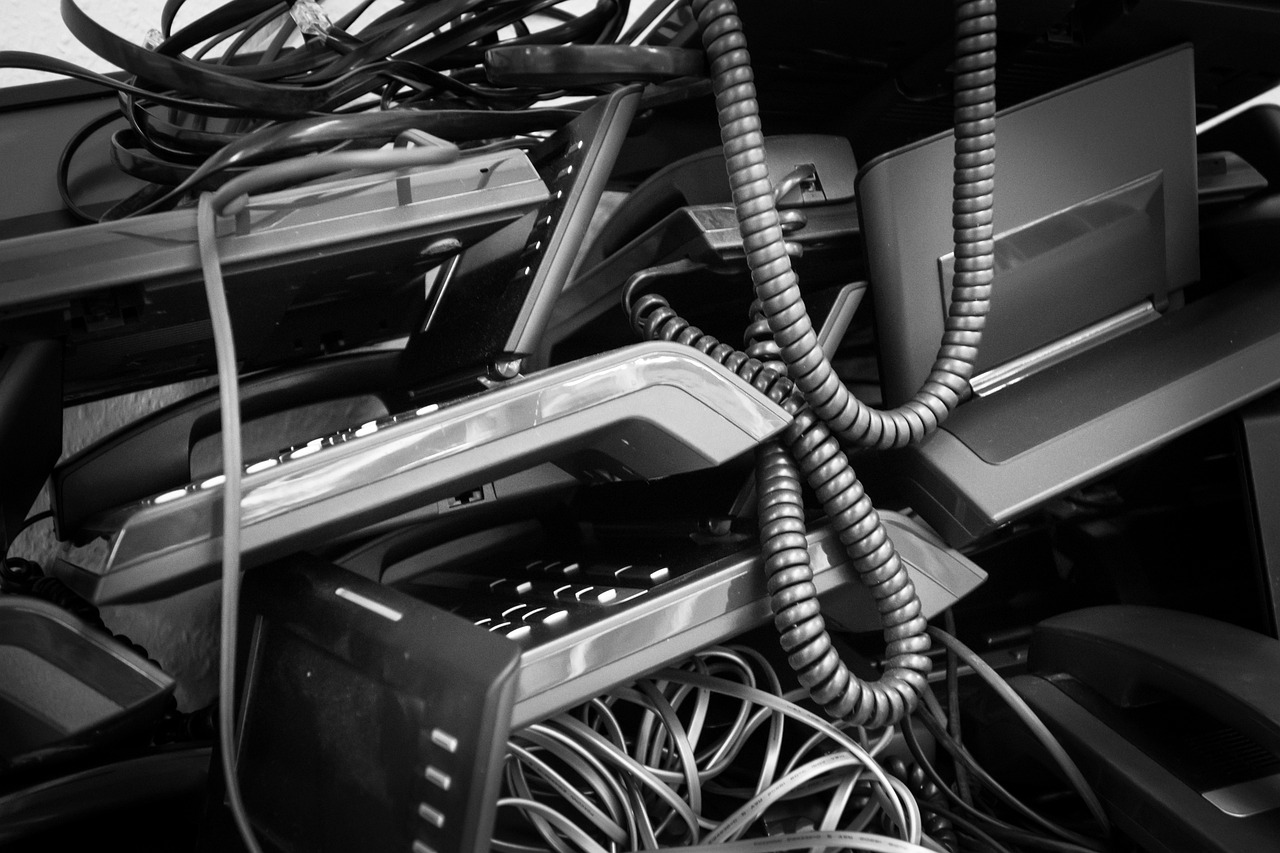
Creating Supportive Legal Frameworks
In order to harness the full potential of the informal recycling sector, it is essential to establish supportive legal frameworks that recognize the rights and contributions of informal waste workers. These frameworks serve as a foundation for creating a more inclusive waste management system that not only acknowledges the vital role these workers play but also provides them with the necessary protections and resources to operate effectively. Imagine a world where the contributions of informal collectors are celebrated rather than overlooked; this vision can become a reality with the right policies in place.
One of the primary goals of these legal frameworks is to ensure that informal workers are granted legal recognition, which can lead to better working conditions and access to social benefits. For instance, when informal workers are registered and recognized by local governments, they can gain access to health services, training programs, and even financial support. This not only improves their quality of life but also enhances the overall efficiency of waste management systems.
Moreover, supportive legal frameworks can facilitate collaboration between formal waste management authorities and informal workers. By creating avenues for dialogue and cooperation, cities can develop integrated waste management strategies that leverage the strengths of both sectors. For example, cities like Bogotá and Delhi have successfully integrated informal collectors into their formal waste management systems, leading to improved recycling rates and reduced costs. This collaboration can be further enhanced by establishing clear guidelines and regulations that govern the relationship between formal and informal sectors.
Additionally, it is crucial to address the safety and health concerns of informal workers through these legal frameworks. Many informal waste collectors work under hazardous conditions, often without protective gear or adequate training. By implementing regulations that mandate safety standards and provide training, we can significantly reduce workplace accidents and health risks. This not only benefits the workers but also contributes to a more sustainable waste management system, as healthier workers are more productive and efficient.
To summarize, creating supportive legal frameworks involves:
- Recognizing informal workers: Legal acknowledgment of informal waste collectors as essential contributors to waste management.
- Facilitating collaboration: Establishing communication channels between informal and formal sectors to develop integrated waste management strategies.
- Ensuring safety: Implementing regulations that mandate safety standards and provide necessary training for informal workers.
By focusing on these critical areas, we can pave the way for a more equitable and efficient waste management system that not only benefits the environment but also uplifts the lives of those who work tirelessly behind the scenes. The future of urban sustainability depends on how well we can integrate the informal sector into our formal systems, and supportive legal frameworks are the first step in this transformative journey.
Q: What are the main benefits of integrating informal waste collectors into formal waste management systems?
A: Integrating informal waste collectors can lead to improved recycling rates, reduced municipal waste management costs, and better working conditions for the collectors themselves, ultimately contributing to a more sustainable urban environment.
Q: How can legal frameworks help improve the safety of informal workers?
A: Legal frameworks can set safety standards, mandate the provision of protective gear, and ensure access to training programs, which collectively enhance the working conditions of informal waste collectors.
Q: Are there successful examples of cities integrating informal recycling initiatives?
A: Yes, cities like Bogotá and Delhi have successfully integrated informal collectors into their waste management systems, showcasing innovative approaches that enhance efficiency and sustainability.
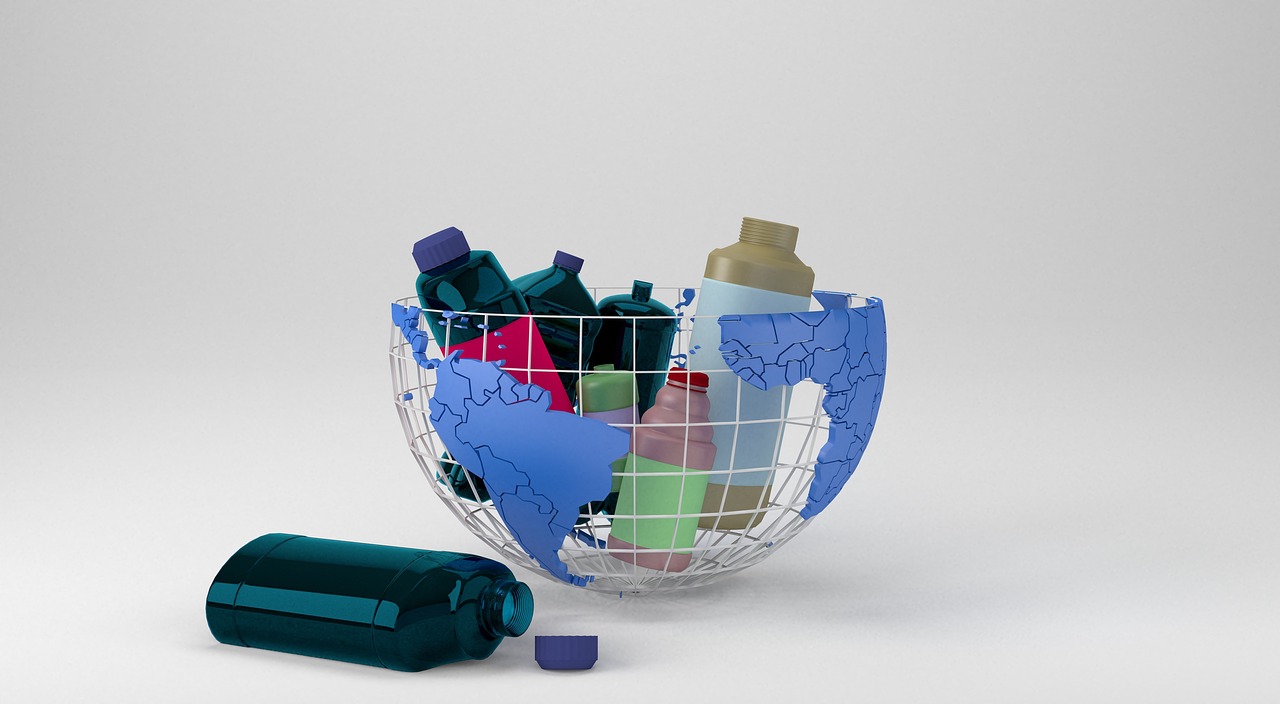
Training and Capacity Building Initiatives
Training and capacity building initiatives are pivotal in empowering informal waste collectors, transforming them from marginalized workers into recognized contributors to the waste management ecosystem. Imagine a world where every individual involved in waste collection is equipped with the skills and knowledge to maximize their impact; this is the vision behind these initiatives. By providing targeted training programs, we can enhance their operational efficiency, ensuring that they not only contribute to recycling efforts but do so in a safe and effective manner.
These programs often focus on a variety of essential skills, including:
- Safety Practices: Training on the proper use of personal protective equipment (PPE) and safe handling of waste materials helps reduce the risk of accidents and health issues.
- Sorting Techniques: Educating workers on how to properly sort recyclables from general waste can significantly increase the quality of materials collected, making them more valuable for recycling.
- Business Skills: Providing knowledge on how to manage finances, negotiate with buyers, and understand market trends can empower informal workers to operate more like entrepreneurs.
Moreover, these initiatives can also foster a sense of community among waste collectors. By bringing them together for training, we create opportunities for networking, sharing best practices, and building a support system that can lead to collaborative efforts in recycling. Imagine a network of waste collectors who not only share tips on efficient collection but also advocate for their rights as workers. This community aspect can be as vital as the skills they learn.
Furthermore, integrating technology into these training programs can enhance learning outcomes. For instance, using mobile applications to track waste collection routes or monitor recycling rates can help collectors become more efficient. By equipping them with modern tools and technologies, we not only improve their daily operations but also prepare them for the future of waste management.
In summary, training and capacity building initiatives are not just about imparting knowledge; they are about transforming lives and enhancing the overall waste management system. By investing in these programs, we are investing in a sustainable future where informal waste collectors are recognized as key players in the recycling industry, ultimately contributing to a cleaner and greener urban environment.
Q: Why is training important for informal waste collectors?
A: Training is crucial as it equips informal waste collectors with the necessary skills and knowledge to operate safely and efficiently, enhancing their contributions to waste management.
Q: What types of skills are taught in training programs?
A: Training programs typically cover safety practices, sorting techniques, and basic business skills to help informal workers manage their operations effectively.
Q: How can technology be integrated into training initiatives?
A: Technology can be incorporated through mobile applications for tracking waste collection and recycling rates, helping workers optimize their efforts and improve efficiency.
Q: What is the broader impact of these training initiatives?
A: Beyond individual benefits, these initiatives contribute to a more sustainable waste management system, recognizing informal workers as vital contributors to environmental sustainability.
Frequently Asked Questions
- What is the role of informal waste collectors in waste management?
Informal waste collectors play a vital role in urban waste management by retrieving recyclable materials that would otherwise be discarded in landfills. They contribute significantly to environmental sustainability and resource recovery, ensuring that valuable materials are reused and recycled.
- How does the informal recycling sector impact the economy?
The informal recycling sector generates substantial economic benefits by providing livelihoods for thousands of individuals. It also reduces municipal waste management costs, showcasing its importance in the broader economic landscape and highlighting how it supports local economies.
- What employment opportunities are available in the informal recycling sector?
The informal recycling sector creates various job opportunities, especially for marginalized communities. This sector not only helps alleviate poverty but also fosters a culture of recycling and resource recovery, making it an essential part of urban economies.
- Can you share examples of successful informal recycling initiatives?
Several cities have implemented innovative informal recycling initiatives that successfully integrate informal collectors into formal waste management systems. These case studies demonstrate enhanced efficiency and sustainability, proving that collaboration can lead to better waste management outcomes.
- What challenges do informal waste workers face?
Informal waste workers encounter numerous challenges, including a lack of recognition, inadequate safety measures, and limited access to resources. These obstacles hinder their ability to operate effectively and safely, impacting their overall contribution to waste management.
- What are the environmental benefits of informal recycling?
Informal recycling significantly reduces landfill waste and lowers greenhouse gas emissions. By promoting sustainable waste management practices, it contributes to improved environmental outcomes within communities, emphasizing the importance of recycling in combating climate change.
- How can policy integration improve waste management?
Integrating the informal sector into formal waste management policies can enhance overall efficiency, improve working conditions, and promote sustainable practices. This ensures that the contributions of informal workers are recognized and supported, leading to a more effective waste management system.
- What legal frameworks are necessary for supporting informal workers?
Establishing supportive legal frameworks that recognize and protect the rights of informal workers is crucial. These frameworks can foster a more inclusive and effective waste management system, ensuring that informal workers have the legal backing they need to operate safely and effectively.
- How can training benefit informal waste collectors?
Implementing training programs for informal waste collectors can enhance their skills, improve safety practices, and increase efficiency. This training ultimately benefits the entire waste management system by ensuring that informal workers are better equipped to contribute to sustainability efforts.

